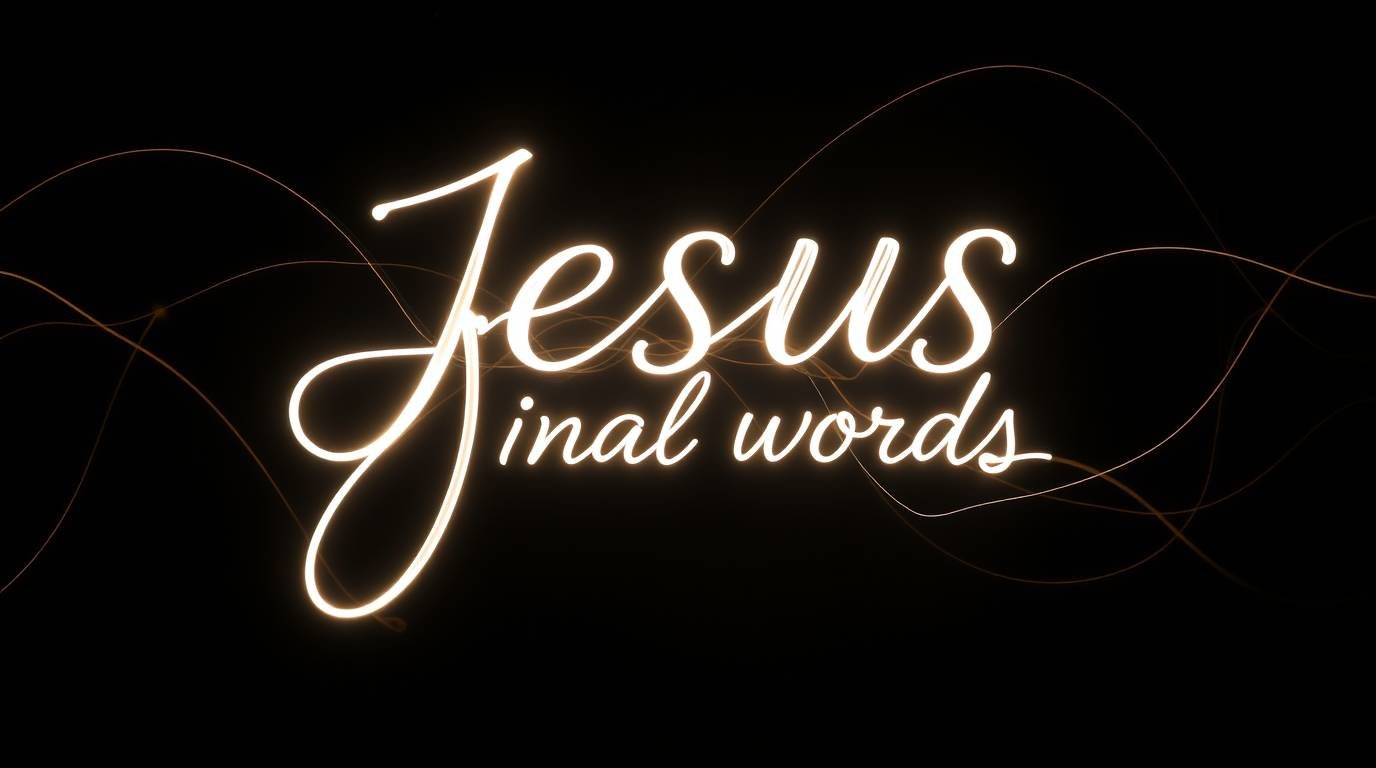Last Seven Words of Jesus on the Cross (7) | Last 7 Words” (or sayings) of Jesus on the cross (Part B)
In Hebrew, the “Last 7 Words” (or sayings) of Jesus on the cross have profound meanings, deeply rooted in the Hebrew scriptures and numerical significance.
Last 7 Words” (or sayings) of Jesus on the cross

Below is an analysis of each statement’s meaning based on the Hebrew language, biblical context, and gematria (numerical values).
1. “Father, forgive them, for they do not know what they do.”
Luke 23:34
Numerical Value: 1661
Hebrew: אָב, סְלַח לָהֶם, כִּי לֹא יָדְעוּ מַה-שֶּׁהֵם עֹשִׂים
(Av, selach lahem, ki lo yade’u mah she’hem osim)
Meaning in Hebrew Context:
"סְלַח" (Selach) means "forgive" and is used in Yom Kippur prayers, linking Jesus' words to atonement.
"לֹא יָדְעוּ" (Lo yade'u) means "they do not know," showing ignorance of the divine plan.
This fulfills Isaiah 53:12: "He bore the sin of many and made intercession for the transgressors."
2. “Truly, I say to you, today you will be with me in Paradise.”
Luke 23:43
Numerical Value: 1111
Hebrew: אָמֵן, אוֹמֵר אֲנִי לְךָ, הַיּוֹם תִּהְיֶה עִמִּי בַּגָּן
(Amen, omer ani lecha, hayom tihyeh imi b’gan)
Meaning in Hebrew Context:
“אָמֵן” (Amen) means absolute truth—Jesus is declaring a divine decree.
“בַּגָּן” (BaGan, “In the Garden”) references Gan Eden (Garden of Eden), the Jewish concept of Paradise.
This fulfills Isaiah 53:11: “By His knowledge shall the Righteous One, my servant, justify many.”
3. “Woman, behold your son! … Behold your mother!”
John 19:26-27
Numerical Value: 593
Hebrew: אִשָּׁה, הִנֵּה בֵּנֵךְ! … הִנֵּה אִמֶּךָּ!
(Ishah, hineh b’nech! … Hineh imecha!)
Meaning in Hebrew Context:
"אִשָּׁה" (Ishah, "Woman") echoes Genesis 3:15, where God speaks of the "woman" (Eve) and her seed (Messiah).
Jesus is creating a spiritual family, fulfilling Jewish kinship traditions.
4. “My God, My God, why have You forsaken Me?”
Matthew 27:46, Mark 15:34
Numerical Value: 696
Hebrew: אֵלִי, אֵלִי, לָמָּה עֲזַבְתַּנִי?
(Eli, Eli, lama azavtani?)
Meaning in Hebrew Context:
Jesus is quoting Psalm 22:1, a prophecy of the suffering Messiah.
“לָמָּה” (Lama) means “why,” showing deep human agony yet trust in God.
“עֲזַבְתַּנִי” (Azavtani, “forsaken me”) aligns with Jewish suffering themes.
5. “I thirst.”
John 19:28
Numerical Value: 192
Hebrew: אֲנִי צָמֵא
(Ani tame)
Meaning in Hebrew Context:
“צָמֵא” (Tzame, “thirst”) also means “spiritual longing” in Jewish texts.
Jesus fulfils Psalm 69:21: “They gave me vinegar for my thirst.”
6. “It is finished.”
John 19:30
Numerical Value: 420
Hebrew: נִשְׁלַם
(Nishlam)
Meaning in Hebrew Context:
“נִשְׁלַם” (Nishlam) means “completed, fulfilled, paid in full.”
Jesus fulfils Daniel 9:24, completing the atonement.
7. “Father, into Your hands I commit My spirit.”
Luke 23:46
Numerical Value: 454
Hebrew: אָב, בְּיָדְךָ אַפְקִיד רוּחִי
(Av, b’yadecha afkid ruchi)
Meaning in Hebrew Context:
“אַפְקִיד” (Afkid, “I entrust”) comes from Psalm 31:5, a common Jewish deathbed prayer.
This shows total surrender to God’s will.
Final Thoughts
The last 7 sayings of Jesus carry deep meaning in Hebrew, fulfilling prophecies, Jewish customs, and spiritual symbolism. Each phrase aligns with messianic themes in the Hebrew Bible. The numerical values add layers of meaning, showing divine patterns.

Jesus’ seven last words: God’s creation and divine plan
Jesus’ seven last words (or sayings) on the cross are significant for several reasons. The number 7 in Hebrew tradition represents completion and perfection, often associated with God’s creation and divine plan. Below are possible reasons why Jesus spoke exactly seven final statements:
1. The Number 7 in Biblical Symbolism
In the Hebrew Bible, the number 7 represents divine perfection, completion, and fulfilment:
God created the world in 6 days and rested on the 7th (Genesis 2:2-3).
7 Feasts of Israel (Leviticus 23).
7 Branches of the Menorah (Exodus 25:31-40).
7 Times Naaman was washed in the Jordan to be healed (2 Kings 5:10).
7 Seals, 7 Trumpets, and 7 Bowls in Revelation.
Jesus’ seven words symbolize the completion of redemption, just as God completed creation in seven days.


2. Jesus Fulfills the Messianic Prophecies
Each of the seven words aligns with Old Testament prophecies, showing Jesus was fulfilling the Messianic plan.
First Word ("Father, forgive them") → Isaiah 53:12 (He intercedes for transgressors).
Fourth Word ("Why have You forsaken Me?") → Psalm 22:1 (Messiah’s suffering).
Sixth Word ("It is finished") → Daniel 9:24 (Atonement completed).
By speaking seven times, Jesus reflects the divine fulfilment of salvation.
3. Spiritual Completion of Jesus’ Mission
Each of the seven sayings corresponds to a major part of Jesus’ mission:
Forgiveness → “Father, forgive them” (Luke 23:34)
Salvation → “Today you will be with Me in Paradise” (Luke 23:43)
Family and Love → “Behold your mother” (John 19:26-27)
Suffering and Abandonment → “Why have You forsaken Me?” (Matthew 27:46)
Humanity and Thirst → “I thirst” (John 19:28)
Fulfilment of Prophecy → “It is finished” (John 19:30)
Surrender to God → “Into Your hands, I commit My spirit” (Luke 23:46)
These show Jesus perfectly completed His mission on the cross.
4. Connection to Yom Kippur (Atonement Rituals)
In Leviticus 16, the High Priest performed 7 acts of atonement on Yom Kippur, the Day of Atonement.
Jesus, as the High Priest and the Ultimate Sacrifice, also speaks 7 times before completing atonement.
5. The Seven Sayings Represent the Seven Covenants of God
Each word connects to God’s covenants with humanity:
Adam (Creation) → Jesus speaks of forgiveness.
Noah (Preservation) → Jesus promises salvation.
Abraham (Promise) → Jesus establishes a spiritual family.
Moses (Law) → Jesus fulfils the suffering of the law.
David (Kingdom) → Jesus thirsts for righteousness.
New Covenant (Grace) → Jesus declares completion.
Eternal Covenant → Jesus surrenders His spirit.
Jesus’ words seal the eternal covenant with God.

6. The Seven Words Reflect the Seven Parts of the Jewish Prayer (Shema & Amidah)
Jewish prayers like Shema (Deuteronomy 6:4-9) and Amidah have seven sections, reflecting full devotion to God.
Jesus’ seven words mirror the Jewish tradition of complete worship.
Final Thought: Seven Words = Divine Perfection
Jesus did not just randomly say seven things. The number 7 is intentional, showing:
Completion of Salvation
Fulfillment of Messianic Prophecies
Divine Perfection in God’s Plan
Connection to Jewish Atonement & Worship
https://youtu.be/hGkQklNMMBs?si=SezV46SC5EpZNG3u
https://divinetruthofnumbers.com/divine-numerological-truths-number-7/




